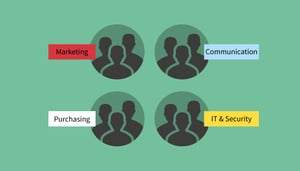In our previous blog: How to select your event registration software? We gave you tips for selecting the right event software partner for your B2B events. In this blog we will explain what else to take into account, before you make your final decision.
You as an event manager have made your decision: Outlook, Excel and Google Forms are no longer sufficient to automate your events. But the selection of (event) software is not something you do on your own. The trick is to know who else to involve - and to know what is important. This is how to do it:
Involve the right stakeholders
Not only you as an event manager can benefit from a good choice - the choice of the right event software involves multiple parties. Don’t forget the following internal stakeholders:
- Marketing: discuss the marketing and event objectives. Find out how your software can be used to collect as much valuable data as possible: this will help you to measure the results and evaluate the goals.
- Communication: decide on the tone of voice for the different events, determine the look & feel, and plan all communication in time.
- IT & security: find out what the prerequisites are for privacy, security and handling personal data.
- Purchasing: you want to convince your colleagues at the purchasing department that the software is a good investment. Check if the features match your requirements and predict what the event software will cost - and what the profit will be (in terms of time, efficiency and prevention of mistakes)
The following 8 points also deserve your attention - and involve different stakeholders.
1. Event objectives
Involve: marketing
Events are organised for a reason - they are part of a (marketing) strategy. But how will you measure the result? Sending out a questionnaire after an event is a good way to evaluate the success. There are many survey tools that vary in user-friendliness, quality and presentation.
When you link your survey tool to your registration and email software, you can easily send out surveys to the attendees of your event, without having to import and export lists. In this way, you don’t need an extra system - and keep everything in one place.
2. White Label software
Involve: communication
Most organisations have clear guidelines concerning external communication, to keep it professional, consistent and recognisable. When selecting your event software, it is important to find out if the software is white label.
In other words: is it possible to apply the company’s identity to the event website and mailings - or is the branding of the software always visible?
3. Easy networking
Networking is a top-3 objective for B2B events. How can your software contribute to this goal? Is the guest list visible for all attendees? And can the visitors contact each other? Some event software suppliers offer this feature, others don’t. Make sure you find out!
4. Advanced registration
Most events involve various guest types, target audiences and break out sessions. Registration for this type of events quickly becomes complex. If you automate the registration process, you lower the probability of making mistakes.
It is important to explore which option your supplier offers - and to what extent you want to use their expertise for complex events. It is important to check the software’s flexibility, so you can adjust it to the requirements of your event. Read more about this in the previous blog: How to select your event registration software?
5. On-site registration
If you want to check in visitors on the day of your event, you can choose from various options:
- Involve an external registration partner, that will bring its own equipment to the event.
- Check in your attendees by making use of a smartphone with (QR) scanner.
- Manual check in with a laptop.
For the last two options, you don’t need additional equipment. And besides that, it’s free! Ask yourself the question if you want to print badges on the spot - not all suppliers offer this option. Prices and possibilities differ strongly - so take the time to compare prices and options.
Tip: involve the costs of the equipment, the crew and the costs per badge.
6. Privacy & security
Involve: IT / Security / Legal
When you work with external suppliers, you give them access to your database, containing your valuable contacts. Look into their policy, and find out how your supplier handles personal data. How will they ensure the data is safe and secure? Where is the data stored? For how long? And what happens to the data after the event? Read more about the new privacy law GDPR here.
It is smart to discuss these issues with your colleagues in the IT /Security / Legal department. They will know what to look for - and will eventually approve or decline your supplier. Make sure they get involved in time!
Tip: Read 5 ways to protect your personal data here.
7. Pricing models
Involve: purchasing
In event software, multiple pricing models are used. They differ in features, licence fees and prices. It is worthwhile to investigate the different possibilities. What is the pricing model does your supplier use? Which features does it contain? Are you paying a price per hour, per registration or a licence fee? And are prices on per month or per year? Make an overview of all the events your company organises on a yearly basis - and use this information to determine which model suits best.
Caution: You organise more events than you think! Internal (board) meetings, business trips and team events are also considered events! Keep them in mind when selecting your software.
8. Support
Involve: purchasing
It’s good to know who you can turn to when questions occur. Good service and support are crucial - especially in the event industry, with so many last minute changes and requests. What does your supplier do to help you? Do they make an effort to come with practical solutions? Is there enough information available about the software? And how easy is it to get in touch?
Discuss these matters with the purchasing department. They have experienced agreements Concerning service and support. Try to have a clear picture of what you need - and compare references about the experience with the supplier in question.
Conclusion
Using the right event software helps you as an event professional to work faster and more efficiently. The landscape of software suppliers and partners is huge - and it requires some research to find the right match.
If you consider the 8 points above - and take time to explore the possibilities, you avoid unexpected costs or unpleasant surprises. Involving the right people at the right time is key. And in the end, all parties will benefit!
Read more
Recently we have published 'The ultimate guide to event registration', in which you will find all the advantages and disadvantages of the event registration systems even clearer.

